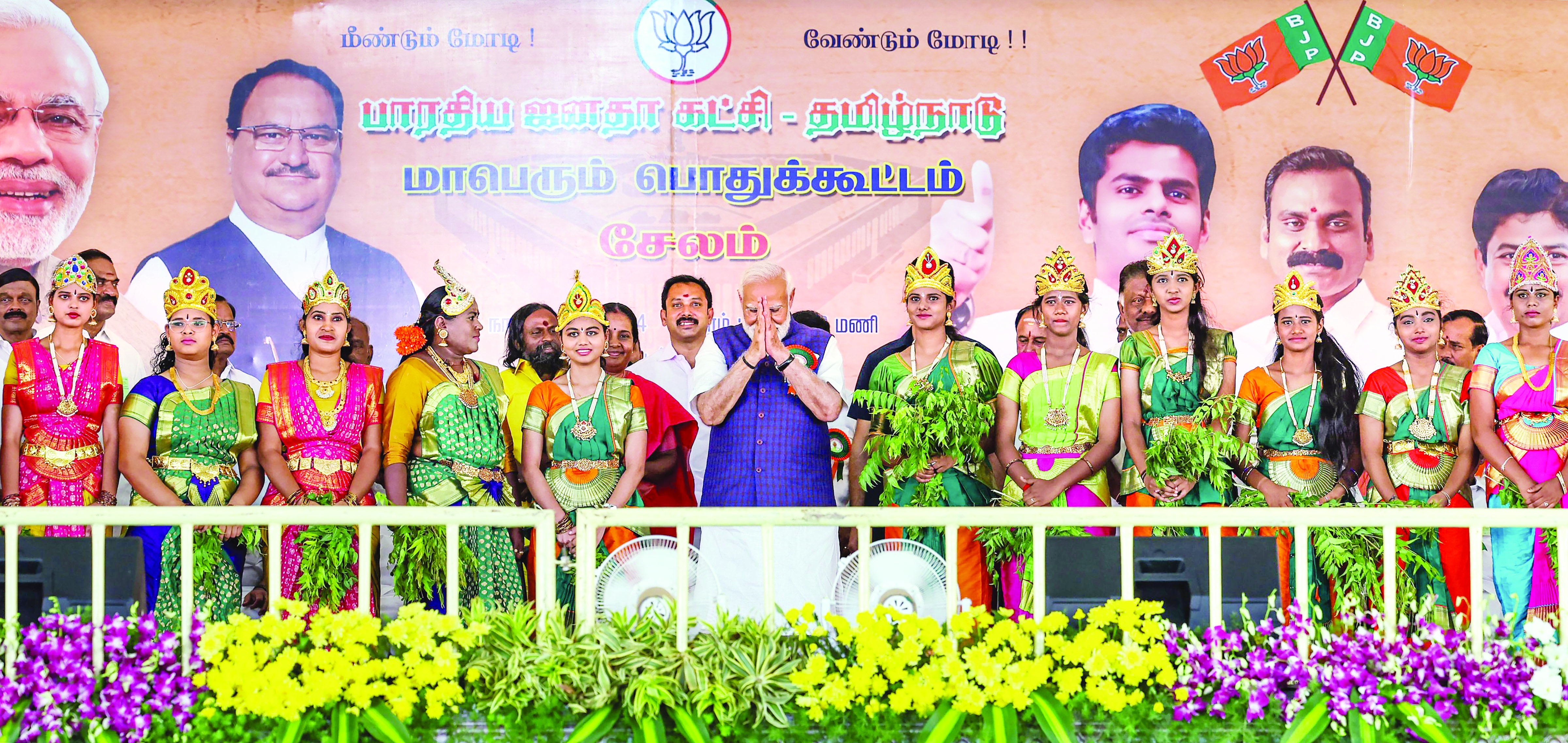PM highlights BJP’s vision in South India, targets political rivals

Chennai: Prime Minister Narendra Modi concluded his extensive tour of South India on Tuesday, which included a roadshow in Kerala and a public rally in Tamil Nadu. It marked the BJP’s ongoing efforts to expand its influence in the south, with PM Modi making a compelling case for his party ahead of the upcoming Lok Sabha elections.
In the past five days, Modi traversed the southern region, conducting roadshows, vigorously campaigning for his party, and robustly challenging his opponents, particularly the incumbent DMK in Tamil Nadu and the BRS in Telangana. He also intensified his criticism of the Opposition bloc over Congress leader Rahul Gandhi’s ‘Shakti’ comment.
Modi has been a frequent visitor to various southern locations over the past few months, crisscrossing the region in an attempt to strengthen the BJP’s presence. His visits often combined official duties with trips to significant Hindu religious sites.
Despite these efforts, the BJP has struggled to make significant electoral gains in the region, with the exception of Karnataka. Kerala and Tamil Nadu have resisted the national trend, remaining aloof from the BJP, which has otherwise seen a resurgence in the 2014 and 2019 polls. PM Modi’s speeches often focused on corruption, dynastic politics, and graft, targeting the Congress and other constituents of the Opposition bloc. He frequently referred to Gandhi’s ‘Shakti’ comment, which also elicited a strong response from him during his public rallies.
The BJP’s intentions were further highlighted by roadshows in smaller cities like Coimbatore in Tamil Nadu and Palakkad in Kerala, aiming to attract more voters and position the BJP as the only alternative to the current major parties for growth-oriented development.
In Kerala, Modi confidently predicted the “blossoming of the lotus” in the state, which is currently dominated by the Congress and Left. In Tamil Nadu, he consistently portrayed the DMK as a threat to the state’s future, accusing it of being anti-woman and corrupt.
He also referred to the late Tamil Nadu Chief Minister J Jayalalithaa of the AIADMK, asserting that her treatment by the DMK demonstrated their attitude towards women, which he claimed was contributing to the increasing crimes against women in the state.
Modi stated in Salem that the DMK is becoming increasingly anxious due to the growing support for the BJP in Tamil Nadu.
Despite the AIADMK severing ties with the BJP last year, Modi refrained from criticising the main Opposition party in Tamil Nadu.
His criticism of Congress leader Rahul Gandhi for his ‘Shakti’ comments at a Mumbai rally was aimed at appealing to female voters. He declared that the upcoming elections would be a contest between those who seek to destroy ‘Shakti’ (women) and those who revere it.
In the midst of this intense election campaign, the BJP’s Tamil Nadu unit appeared to have outmanoeuvred the AIADMK by securing a seat-sharing agreement with the Pattali Makkal Katchi (PMK), led by Dr S Ramadoss. The agreement was signed on Tuesday morning, just hours before Modi’s event in Salem.
There were rumours in political circles that the AIADMK had finalised an alliance with the PMK, which was part of the NDA in the 2014 and 2019 elections. This prompted Modi to announce that the NDA has gained new momentum, as he praised Ramadoss’s seniority and experience.
The PMK, backed by the Vanniyar community, has considerable influence in some of the state’s northern districts.
Modi is expected to make additional visits to the region, as Assembly elections are also scheduled in Andhra Pradesh, where the BJP is allied with the TDP and Janasena, led by former Chief Minister N Chandrababu Naidu. The alliance is eager to topple the current YSRCP government under YS Jagan Mohan Reddy.



